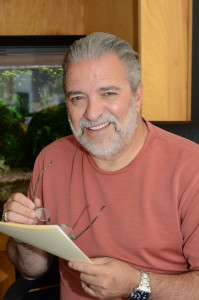Part II
This is the second half of our two-part blog series on Dr. David Lowenstein. It picks up where we left off in the first post, and discusses everything from his counseling work in New York City after 9/11 to his plans for the future.
You traveled to New York City after 9/11 to volunteer your time to help the city heal. What was that like?
I’m from the New York City area, and I have always felt like New York was the best city in the world. On September 11, 2001, a client came into my office and told me about a plane that had hit the World Trade Center. At that time, I thought it was maybe a small, single-engine plane that made a wrong turn and hopefully everyone was okay. But, as we all know, it didn’t turn out that way.
I contacted the local chapter of the Red Cross and the American Psychological Association in Washington, DC to find out how I could help. Soon after, they asked me to travel to New York City. Although a plane was transporting people from Rickenbacker Air Force Base to New York City, it was the first time I was scared to be in the air. There were no other planes in the air at that point, and I didn’t want to be the only one, so I left the next morning by car. I can still remember seeing the smoke from as far away as Scranton, Pennsylvania, which is still about three hours from Manhattan.
I still had memories of being about 12 years old and accompanying my father, who owned a construction company, to one of his jobs in Manhattan. We had lunch that day at Windows on the World, a restaurant on the top floor of the North Tower of the World Trade Center complex, and I remembered the building from that childhood experience.
After arriving in New York, I spend several days working with family members who were concerned they had lost a loved one. I often had to explain to them why they were being asked to bring a toothbrush or hairbrush that belonged to their missing loved one. It was difficult to explain that it was needed for DNA matching. I also spent a day working at the fire station near the World Trade Center, the same station that was home base for many of the firemen who were trapped in the building when it collapsed. It was so difficult to hear those people talk about what they saw and heard.
I was only allowed to stay for a week, and at the end of that week I remember not wanting to leave because I felt like we were not done. The experience really changed my life, seeing what had happened and listening to people’s stories. It was a very moving experience.
What do you like to do in your free time?
I really love spending time with my family. Our daughters are grown, so my wife and I are empty nesters. One daughter is living in New York City, attending undergraduate school and having a great time. Our other daughter lives in Columbus and works in public relations. It’s a wonderful experience to watch them grow and become young adults.
Recently, my wife and I rehabbed a house in German Village, and we are really enjoying our life here. I get to walk to work every day, which is really exciting. You can never be late when you walk to work. And you never have to worry about traffic reports.
What are your future career plans?
I think I will work until the day I call it quits. My father and mother both died of complications from Alzheimer’s disease, which is scary because there is a hereditary component. But my father enjoyed what he was doing professionally and did not stop working until he was in his early 70s. Whatever I do, I hope to eventually cut back so I can enjoy more free time, but hopefully I will continue to do psychological work with adults, children and families.
What would you still like to accomplish in your career?
I’ve heard so many stories from people over the years, and many of them are about funny things that happened to them or great experiences they’ve had. I’d love to write a book about being a psychologist in this small area of Columbus called German Village. Without sharing names, of course, I’d like to talk about the people I’ve met and what they’ve provided me—because most of the people just tell me what I’ve provided them. I’ve seen thousands of people over the last 35 years, and they’ve helped me grow and become a better psychologist. I would also like to talk about the many attorneys, judges, counselors, physicians and teachers who I’ve been in contact with. They’ve all really provided me a lot of things.
David Lowenstein, Ph.D. is a psychologist and the clinical director of Lowenstein & Associates, Inc. in Columbus, Ohio. In addition to providing therapeutic services to individuals and families, he offers training and consultation to numerous associations, schools and agencies around the country. Additionally, he is a frequent radio and TV guest and a resource and contributing writer for numerous newspapers and magazines nationwide. Contact Dr. David Lowenstein at 691 South Fifth Street, Columbus, Ohio, 43206, or call 614.443.6155 or 614.444.0432.


